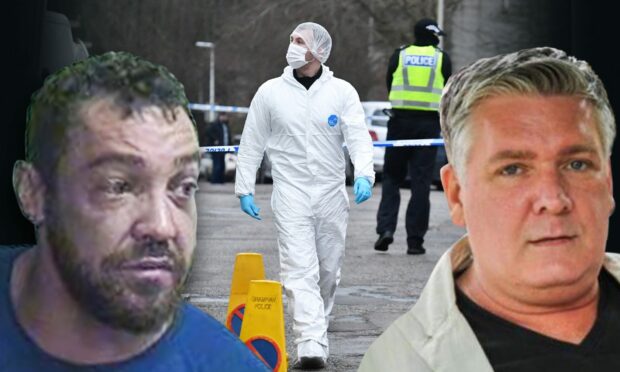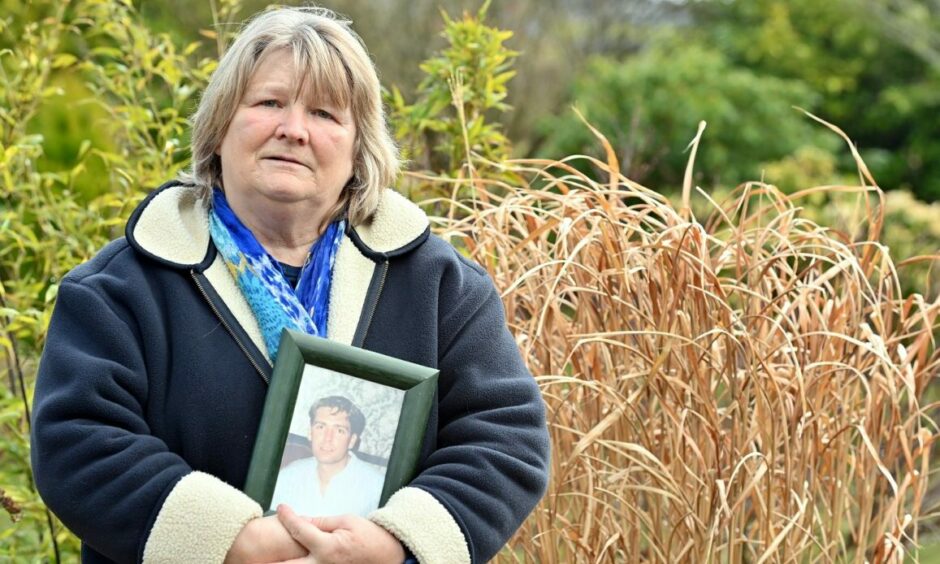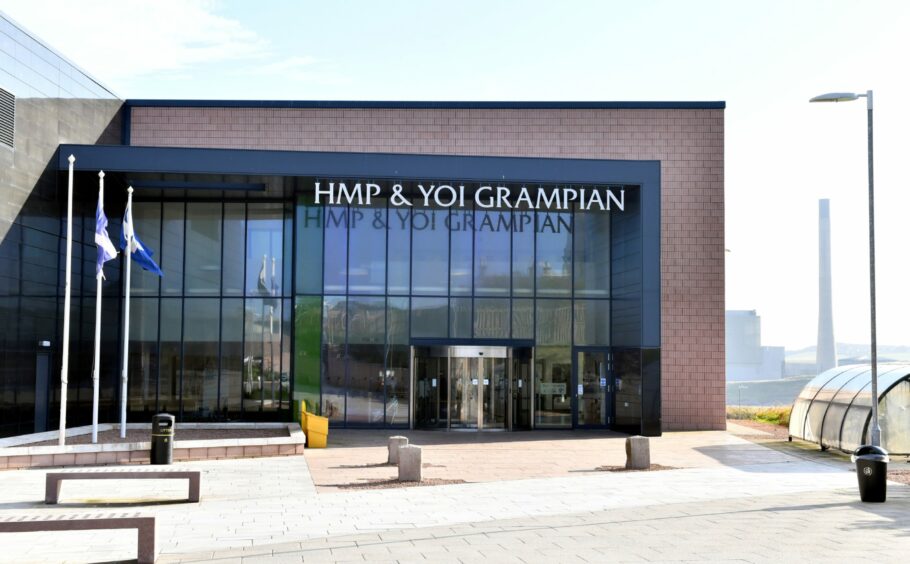The sister of a man who was murdered by a newly released mentally ill prisoner today vowed to sue the authorities following the publication of a “damning” report.
Alan Geddes was stabbed 40 times by Stuart Quinn after he offered the homeless former prisoner a bed for the night.
Now, a report into the circumstances leading up to Mr Geddes’ death by the Welfare Commission Scotland has concluded the dad-of-one might still be alive today had Quinn been given accommodation upon his release from HMP Grampian.
North-east MSP Douglas Lumsden, who has been supporting the Geddes family in their calls for a full investigation, said the new report highlights “cataclysmic failings of Scotland’s justice system”.
Mr Geddes, 56, was killed in December 2019 after he met Quinn, then 35, in an Aberdeen nightspot.
Murderer gets 18 years
Quinn – who was treated a number of times in a psychiatric hospital for drug-induced psychosis – had been released from HMP Grampian in Peterhead hours earlier without a support package or accommodation in place.
On learning that Quinn had nowhere to go, Mr Geddes played good Samaritan and offered him a bed in his Ruthrieston Crescent flat.
Neighbours in the block were awoken at around 5.35am by the sound of incoherent shouting and banging on railings in the communal hall and Mr Geddes was found lying at the bottom of stairs with “multiple and significant” injuries.
Quinn, 35, was sentenced to 18 years in prison for the brutal murder in February 2021.
Sister’s quest for justice
Since then, Sandra Geddes, 67, has campaigned tirelessly in her late brother’s name for an investigation into the circumstances surrounding Quinn’s release to be held.
She says the Welfare Commission Scotland report has answered many of her questions and fuelled her ambition to bring legal action against a number of authorities, including NHS Grampian and the Scottish Prison Service.
The Welfare Commission Scotland report – which is anonymised – concluded: “If [Quinn] had been offered accommodation in December 2019 this is likely to have reduced the risk to the specific victim who invited him to his home because of his lack of accommodation.”
The report said his “unexpected liberation” from prison meant there was no support in place.
It said: “On 6 December [Quinn] appeared in court and was liberated with no arranged support or accommodation.
“He was conveyed back to prison after liberation to collect his belongings and medication, and he was reported to be distressed by the decision to release him from
custody which had not been anticipated nor planned for.
” [Quinn] subsequently reported that he had spent some time walking around the city centre and at some point, was offered and consumed cocaine.
“He went to a club where he met the victim, previously a stranger to him. Subsequently, having apparently failed to secure overnight accommodation elsewhere for [Quinn], they went to the victim’s house where the homicide occurred.”
A history of mental health-related hospital admissions
The Mental Welfare Commission report highlighted that Quinn had been treated for mental health issues at least four times in the past and had been admitted to a psychiatric hospital between March and June 2018.
He was diagnosed with drug-induced psychosis and on each admission to hospital he was found in possession of a potential weapon.
Despite an “increasing concern about the risk of future violence” Quinn was not seen by clinicians for six months between June 2018 and January 2019 and then spent most of 2019 in prison.
The report found there are recognised gaps in Throughcare provision – a support service to assist prisoners to prepare for release and to help them resettle in the community.
The investigating team spoke to the head of justice at the Scottish Prison Service, who confirmed that the SPS Throughcare Support Service was suspended on September 13 2019, less than three months before the killing.
In its recommendations, the Welfare Commission Scotland said the Scottish Government and Community Justice Scotland should address the recognised gap for Throughcare services for prisoners on remand.
‘I finally have the facts’
Ms Geddes “hoped it would never come to this” but says a newly released report into her brother’s death has made her “all the more determined to take on the different organisations”.
She told The Press & Journal the report was welcomed but it had made her “angry” to see the truth of the circumstances in black and white.
“I have never been angry about what happened, I couldn’t be angry because I didn’t have the facts,” she said. “But I felt something was not right.
“When I got the report I felt angry, though. The first paragraph I read said that if Quinn had been given accommodation my brother would not have died. It clearly admitted he had mental health issues.”
“I think the system is dire,” Ms Geddes added.
“It shows that if things had been put in place my brother would still be alive. That’s not to say someone else wouldn’t have been murdered because he was a danger to society.
“But there are procedures which should have been in place. They knew he was going to go out, take drugs and become psychotic.”
A Scottish Prison Service spokeswoman said: “Whilst we do not comment on individual cases, we endeavour to ensure that individuals liberated from custody have appropriate support networks in place, to aid their transition back into the community.
“We work with a range of agencies to enable the continuity of service provision for those leaving our care.
“We will continue to work with the Scottish Government and community partners, to ensure individuals have the best possible chance for successful reintegration.”
A spokesperson for NHS Grampian and the Aberdeenshire Health and Social Care Partnership said: “We note the findings of the report and will action the recommendations within the timeframe set out.”
A Scottish Government spokesperson said: “We will carefully consider this report before responding formally. Our thoughts continue to be with the family of the victim of this tragic event.”
An Aberdeen City Health and Social Care Partnership spokesman said: “Aberdeen City Health & Social Care Partnership will carefully consider the report and act upon any of the recommendations which may fall to ACHSCP.”
Renewed calls for Fatal Accident Inquiry
She said she hopes the new report will prompt the Crown Office to hold a Fatal Accident Inquiry (FAI) into her brother’s death – something they had previously ruled out as not being in the public interest.
A previous investigation was carried out into the case by the Scottish Fatalities Investigation Unit (SFIU) after it was claimed during the court case that the homeless unit he should have checked into after leaving prison was closed.
The SFIU found “no record” of Quinn attending at any of Aberdeenshire or Aberdeen City councils’ 24/7 accommodation units.
After the inquiry, the Geddes family received a letter saying the case was concluded and counsel for the Crown Office instructed that no FAI would be carried out.
However, the letter also said: “Had it been the case that a mentally disturbed prisoner was released without support then a significant public interest issue would arise.”
Speaking about the revelations about the case in the Welfare Commission Scotland report, Ms Geddes said: “I wouldn’t have had any of this if I had waited for the prosecutor’s office to do this investigation.
“The commission has given me the answers I needed.
“I think they have done a very good job. They have been great at communicating with me, they have listened to me and they have come up with recommendations.”
‘Cataclysmic failings of Scotland’s justice system’
Ms Geddes has now approached north-east MSP Douglas Lumsden, who is backing her calls for an overhaul of the system.
Mr Lumsden said: “This damning report highlights the cataclysmic failings of Scotland’s justice system and how easy it was for a violent, high-risk offender to be released early with no consideration of the dangers he posed to the public.
“The lack of rigorous assessments, in this case, has exposed significant gaps in mental health, prison aftercare and supervision.
“There must be a complete overhaul of the system which currently, under this SNP Government, puts the wishes of criminals ahead of the needs of victims, as we have tragically seen in the case of Alan Geddes.
“Alan was a good Samaritan who died merely because he stepped in when others had failed. His sister and the rest of the Geddes family didn’t deserve to chase justice for as long as they have.
‘I am doing it for his little boy’
“‘Unexpected liberation’ is a sleekit description of automatic early release, which the Scottish Conservatives want to scrap to ensure victims, not criminals, are at the heart of our justice system.
“The Scottish Conservatives will amend the SNP’s upcoming Bail and Release from Custody Bill to ensure more checks are in place when prisoners are released – including the ending of automatic early release.
“The whole system needs overhauling to prevent a similar tragedy, and I support the Geddes’ in their battle to get that done.”
Ms Geddes said she thinks her late brother would approve of her fight – and says it’s his 10-year-old son Lucas who also deserves justice.
She said: “Alan would be saying ‘Sandra go do it. Do it for justice and do it for my little boy’.
“I am doing it for his little boy as well as for him.
“I feel strongly that I have to make a change so that nobody has to suffer like we have had to suffer as a family.”
For all the latest court cases in Aberdeen as well as crime and breaking incidents, join our Facebook group.




